As the trailblazers of the Vedic metal subgenre, Singaporean band Rudra has a reputation for traversing the boundaries of black and death metal by incorporating traditional Indian music and Sanskrit mantras into their unique repertoire of songs.
This distinctive interpolation of two seemingly disparate genres of music results in an avant-garde sound that is characteristically Rudra—you’ll certainly be hard-pressed to find another band whose lyrical content draws inspiration from Vedic philosophy the way they do.
Since their inception in 1992, Rudra has seen several line-up changes but one thing that has remained consistent for the band is their unwavering dedication to putting out innovative albums which metalheads around the globe can thoroughly appreciate.
Bandwagon had a chat with Kathir (vocals, bass), Shiva (drums), Devan (guitars), and Vinod (guitars) to run through Rudra's extensive discography of studio albums starting with their 1995 demo ‘The Past,’ and finally ending with 2016’s ‘Enemy of Duality.’ If you've ever wondered how the band would rank their oeuvre of works, read on to find out.
THE PAST (DEMO, 1995)
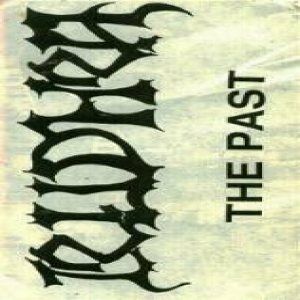
This 4-track demo was put out in 1995 when Rudra was still a three-piece band that went by the name RUDHRA. Tell me more about how this demo came to be, and why you decided to alter the band name?
Shiva: The demo was way back in 95’ with the original line-up which was me, Kathir, and Bala. We started in 1992 as a three-piece band and progressively played in many band competitions back then to gain some exposure. We even entered the finals in one of them. Along the way, we felt that one guitar wasn’t good enough so we got another guitarist to join the band. At that point in time, the birth of the band brought Kathir and me together as we both wanted to play underground music that was heavy and fast. If you listen to ‘The Past’ demo, the music sounds a lot more like melodic death metal which is quite different from what we’re now playing.
Kathir: The reason why we altered the name of the band is because we felt that in proper Sanskrit translations, the ‘H’ did not belong there. When we started to write a new debut album, we decided to correct that error so we dropped the ‘H.’ There are some guys who tend to claim that these are two different bands which Shiva and I disagree on because we have been continuously present in both those line-ups, all the way from 92’ until now, and we still play the songs on this record.
Your next three albums have recently been re-issued by the Beijing-based label Awakening Records. Since it has been almost 30 years since they were first released, were you stoked to see new cover artworks, and also listen to the remastered versions of these albums?
Kathir: We initially felt that giving the albums each a new cover art was not the most exciting idea but when we actually saw the mind-blowing artwork itself, we realised it was a great decision. From a marketing perspective, we required a kind of refresher so the four of us felt that we should go with it. It was a sonic renewal visually because we spent a lot of time with the designer who created these hand-drawn paintings. Vinod was the one who remastered the albums, and I think he did a great job on that. The sound is very monstrous.
Vinod: Basically, the original versions of the first three albums were great but I felt that it could sound more powerful so that’s what we tried to achieve when we decided to remaster it. We added more volume, and more bass so it sounded fuller even though it was the same recordings. You can feel a little bit more energy and dynamics coming out of the remastered version. It was a nice experience—even though I wasn’t involved in these recordings, I was involved in the sound of these albums.
RUDRA (1998)
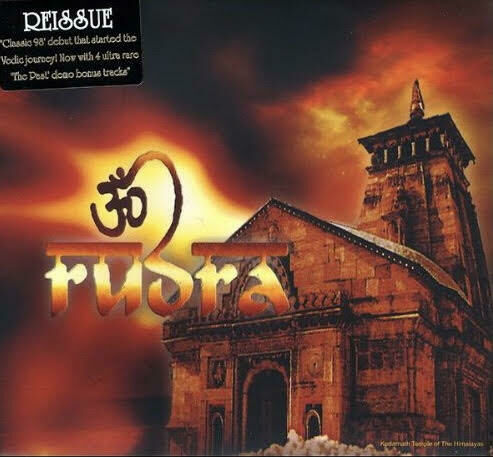
It has been 23 years since your self-titled album came out. What went on in the making of ‘Rudra’?
Shiva: As for the debut album, it was quite painful because the band Rudhra with the ‘H’ had other guitarists who we were close with but split from because we had our own musical differences. I was in the Air Force at that time and one fine day, I got a phone call from Kathir who said ‘I’m thinking of doing a Vedic Indian kind of band concept. Would you be interested?’ I couldn’t say no, and the rest was history. Kathir even bought a drum set and double pedal for me. We had everything at his house, and that’s when we actually started to compose ‘Rudra.’
I would say this album is a monumental success because it did really well when it first came out. How does it feel knowing that your debut set the direction, and laid the groundwork for your band?
Kathir: When we recorded this album, it was a risk we were taking. Shiva and I were talking about what we were hearing in the studio but we were doubtful about whether the metalheads would accept it. That was a big question for us because there was no precedent for something like this with Sanskrit chants, Indian classical music, and all of that. So we were wondering what the response would be. It was a complete risk and gamble to see how the metal world would respond to our self-release. We put it out in tapes, and the next thing we know, someone calls us saying ‘Hey, I’d like to sign you guys. We’re going to release this in Asia first.’ We were surprised that someone would want to do this. After we were signed, we got our first cheque that was a four-figure sum. It was quite unbelievable for a band in the 90s to get that much money as an advance.
How do you think the songs from your self-titled are holding up today? Are they still fan favourites?
Kathir: I think they are. There’s a tie between this album and The Aryan Crusade as people consider the second album to be seminal, and definitive of the Vedic metal sound. Shiva made a very good point that every song on that album sounds different. This was a very conscious and deliberate decision. It was because of the template that we had. I remember telling him that I wanted this album to be like Black Sabbath’s Vol.4 but not in terms of sound, in terms of the diversity of the songs. We wanted every song to be distinct. It became our best-selling album to date. At that time, there was no digital platform—either you buy a tape or you buy a CD. It even got released in Europe and Indonesia.
Was it exciting going on tour with all this new material?
Shiva: Our first overseas tour outside of Singapore and Malaysia, was in India. It was really exciting because we were young, and it was a big show with many people attending.
THE ARYAN CRUSADE (2001)
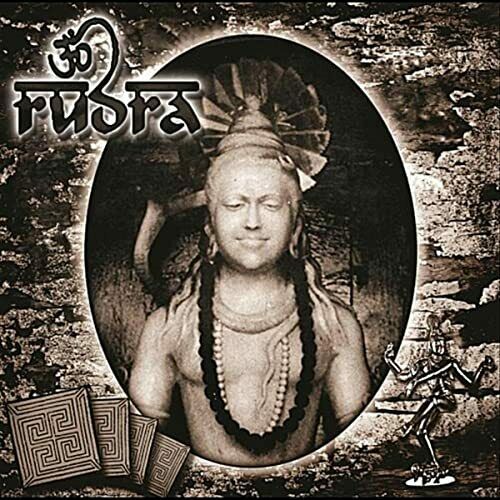
Tell me more about your sophomore album, The Aryan Crusade.
Kathir: With the relative success of our debut album, we became really bold actually. That gave us a kind of strength, conviction, and motivation to do something a little more pronounced in terms of the Vedic metal genre. We held back before because we wanted to test the waters but with The Aryan Crusade, we knew that we had passed that test. We knew that we could sell this many units, and we knew that we had fans across the globe. Because we didn’t hold back, the title in itself was very controversial because we knew that we were going to get flak for the word ‘Aryan.’ It was very deliberate. We wanted to make a statement. We spent a lot of money on the recording but it was worth it. Lyrically and musically, it was very bold. We wanted to just spread our wings and do what we do best.
How do you feel about the word ‘Aryan’ being misconstrued; say, by European distros at the time?
Kathir: At that time, we felt that it was utter stupidity for anyone to consider the word to be a derogatory term because that word has a very ancient root that goes back even 2,000 years prior. This word appears in Sanskrit texts so we thought it was an aberration that contemporary civilisation and culture would look at it negatively. We wanted to use that word to provoke. That was the intention. The reason why we wanted to do that was to create curiosity around that word, and possibly to debunk myths around it.
The Aryan Crusade speaks volumes of the Vedic Metal sound. Why do you think the opening song ‘Aryaputra’ is such a crowd favourite during live shows?
Shiva: Probably because of the way the song starts. It begins with a mid-tempo riff and goes into a slow blast beat. The chorus is also quite popular with the crowd. I don’t know why the song became so successful but yes, it has always been our first song after the intro. Over the years, I guess the crowd got used to it. To the point where if we start with another song first, they’d get disappointed.
Vinod: I guess I could answer this question too. When ‘Aryaputra’ first got released, I wasn’t part of the band yet. I was still a fan. I’ve heard all the songs from the album but there were a few songs that really stood out to me. ‘Aryaputra’ is maybe like Megadeth’s Holy Wars or Metallica’s Enter Sandman. That was Rudra’s ‘Aryaputra’ basically. That was probably the catchiest song that the band actually had so that was the one everyone was always looking out for.
‘Malevolent Creed’ seems to be reminiscent of Death’s Human. I know you guys also did a cover of ‘Pull the Plug’ and ‘Forgotten Past’ on your EP Invoking the Gods—are you guys huge fans of Death? What other death metal bands have inspired Rudra?
Devan: I think all of us like Death. Vinod especially.
Vinod: When we chose the songs for that album, each of us wanted to choose something that resonated with us, and my choice was basically Death. It was also a band that everyone liked.
Devan: I think Slayer is the one that tops everything else.
Kathir: Obituary for me.
Vinod: Carcass, can’t forget that.
Shiva: I have a long list but I would say Deicide.
KURUKSHETRA (2003)
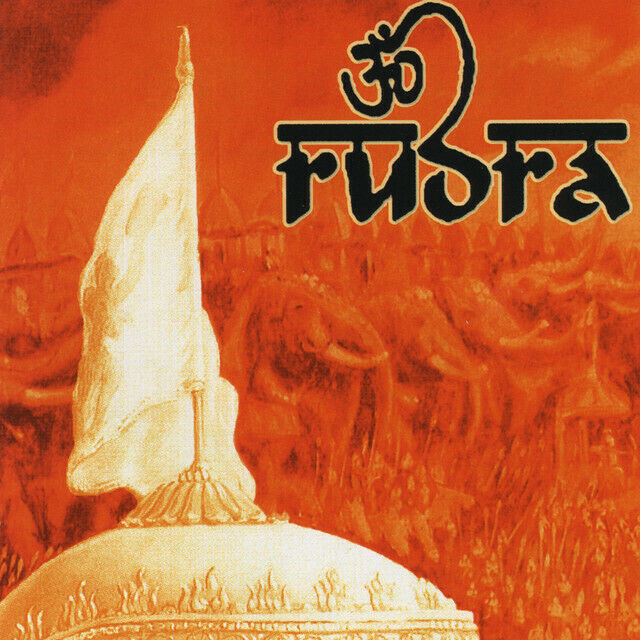
Let's talk Kurukshetra.
Kathir: By this time we had already rented a studio. We booked a room for two years, and we decided to write an album with our own equipment in the room. This was the first time we did that. With The Aryan Crusade, we did not see as many unit sales because of Napster. The large scale download platforms completely destroyed the sales. Most bands were suffering because of illegal downloads. From there, we were not interested in looking out for sales anymore. But people were getting to know us across the globe so we started to write albums based on very strong themes.
I understand Kurukshetra was inspired by the battlefield in the epic Sanskrit poem ‘Mahabharata.’
Kathir: Yes, Kurukshetra is actually about an ancient battlefield in the Sanskrit epic. We wanted that album to be as if we were actually in a battle scene. At the same time, I think The Lord of The Rings movie had just been released. I’m not sure which one from the series but the guitarist we had at the time, Kanan, gave me a call saying the battle scenes were just amazing and monumental, and he would like to have that in mind when writing this album so he distinctly brought those scenes into his head during the writing process. I’m not a big fan of The Lord of The Rings myself but I felt that it was real fuel for us to have in our heads when we were writing the album. Again, Kurukshetra represents a lyrical onslaught and an intellectual battle that was taking place in someone’s mind. The opening song is a very succinct way of presenting the whole album so we called it ‘Justified Aggression.’ The battle is not outside, it’s inside our heads; now that’s the battle that is worth fighting because it is a philosophical assault on everything that is negatable. We even have a song called ‘Negate’ on the album.
It seems that a lot of Rudra’s lyrical content is deeply influenced by literature and philosophy—what initially spawned the idea to incorporate these textual elements into your songs?
Kathir: Yes because as metalheads, lyrics have always been serious stuff. We thought that we could bring another aspect of this seriousness to metal, in the form of Indian philosophy, and basically, our interpretation of whatever we’ve read or have been inspired by. Kurukshetra represents a time when we saw a lot of religious tension around us. This was across the globe right after 9/11. It was primarily fanatism, terrorism, and all of that, and I’m not talking about any particular religion per se. The very response to terrorism can be terrorism itself. It’s not that we’re looking at a group of people and trying to profile them by saying they are terrorists. That’s not the point. The way we deal with terrorism itself can promote terrorism in my opinion. So we were actually very critical of ideologies regardless of what they are—any kind of ideology or belief system that kind of betrays the very nature of humanity. That was what we were up against, and that was the inspiration for Kurukshetra.
BRAHMAVIDYA: PRIMORDIAL I (2005)
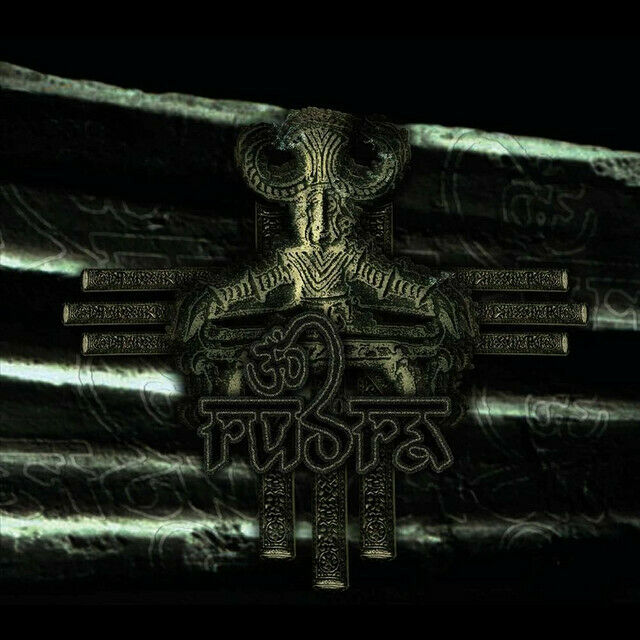
Was Brahmavidya always meant to be a trilogy?
Kathir: Primordial I is a very important album, at least from my perspective. It was the first time we thought of the idea of a trilogy, and it was our first conceptual album. It also became a kind of textual commentary—we were taking ancient texts that were as old as 3,000 years, and we were making each song sort of a commentary of an aspect of the text. Primordial I becomes one of those albums that harrows the beginning of conceptual albums for Rudra. For the first time ever, we also got a producer for an album. We heard a demo Joshua produced and thought it was immense so we asked if he could produce our album. This was the first album we didn’t produce ourselves. The production value was quite different, and this album was also signed by another label in Malaysia. In many ways, Primordial I was the beginning of kind of phase two in the band’s history.
Shiva: The first three albums were recorded without a click track. This was the first album for me that was recorded using one so it was something very different. Our anthem song in this album is ‘The Pathless Path to the Knowable Unknown.’ That song is the most played. I think we play that song at the end of every gig. When we first jammed this song, it didn’t form an impression at all. It was only after the song was actually recorded, did we start to like it. And the rest was history.
Kathir: Every time we write an album, the lyrics are not done yet. The vocal performance isn’t there so we don’t get the full picture. The thing that stands out in 'The Pathless Path to the Knowable Unknown’ is the repetitive chant that wasn’t there when we were jamming in the studio. But the moment we started to layer that song with chants and vocals, we saw a different dimension to that song. It was premature when we were jamming in the studio, and Shiva is right, it was at the bottom of the list so we almost eliminated that song from the album. It’s a great thing we didn’t because it became the most popular song on Spotify.
I've also been meaning to ask: how much influence does Black metal have on your albums?
Kathir: I think Kurukshetra and The Aryan Crusade have black metal influences. The reason is that we were very big fans of Bathory who predated the modern Norwegian black metal stuff. We were schooled by Under the Sign of the Black Mark, The Return…..., and Blood Fire Death. These very early Bathory recordings very much formed our black-death sound.
BRAHMAVIDYA: TRANSCENDENTAL I (2009)
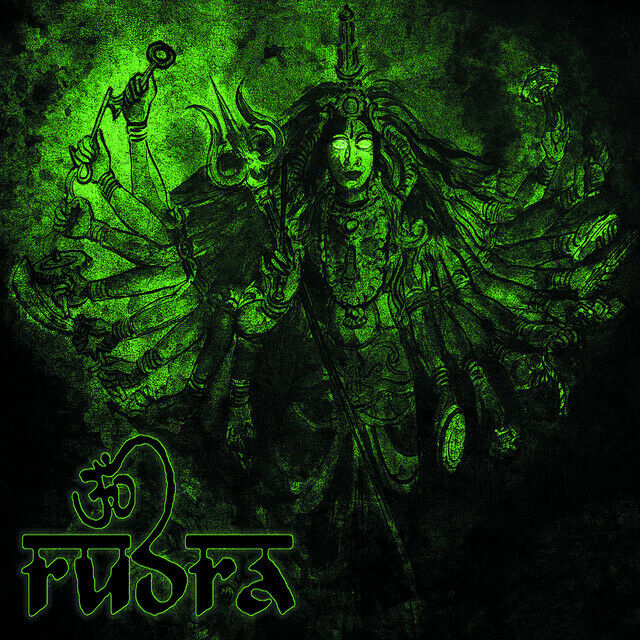
Moving onto Transcendental. Devan, do you want to talk about this one since you were involved?
Devan: That’s when I first joined Rudra. Having been a big fan of Rudra from the debut album, when I first heard Primordial, I felt that it was so different to all the earlier albums because it’s very modern sounding. The incorporation of all the Indian instruments is a little bit more pronounced there. When I came into the picture for Transcendental, I remember speaking to Kathir and Shiva about exploring more Indian sounding guitar riffs, and so we had very good jam sessions in the studio where we worked on some of the melody sections. It’s a lot more Indian-ised I would say, and even faster than Primordial because we were trying to explore click tracks around 220 and 240. We were trying to push the limits basically. The songs are much longer; there’s a lot more going on with the drums, the guitars, and the bass as well, in terms of technicalities. It was a natural progression from the previous album. Every album brings a different kind of experience so I think Transcendental at that time came naturally. It sounded very grand I would say.
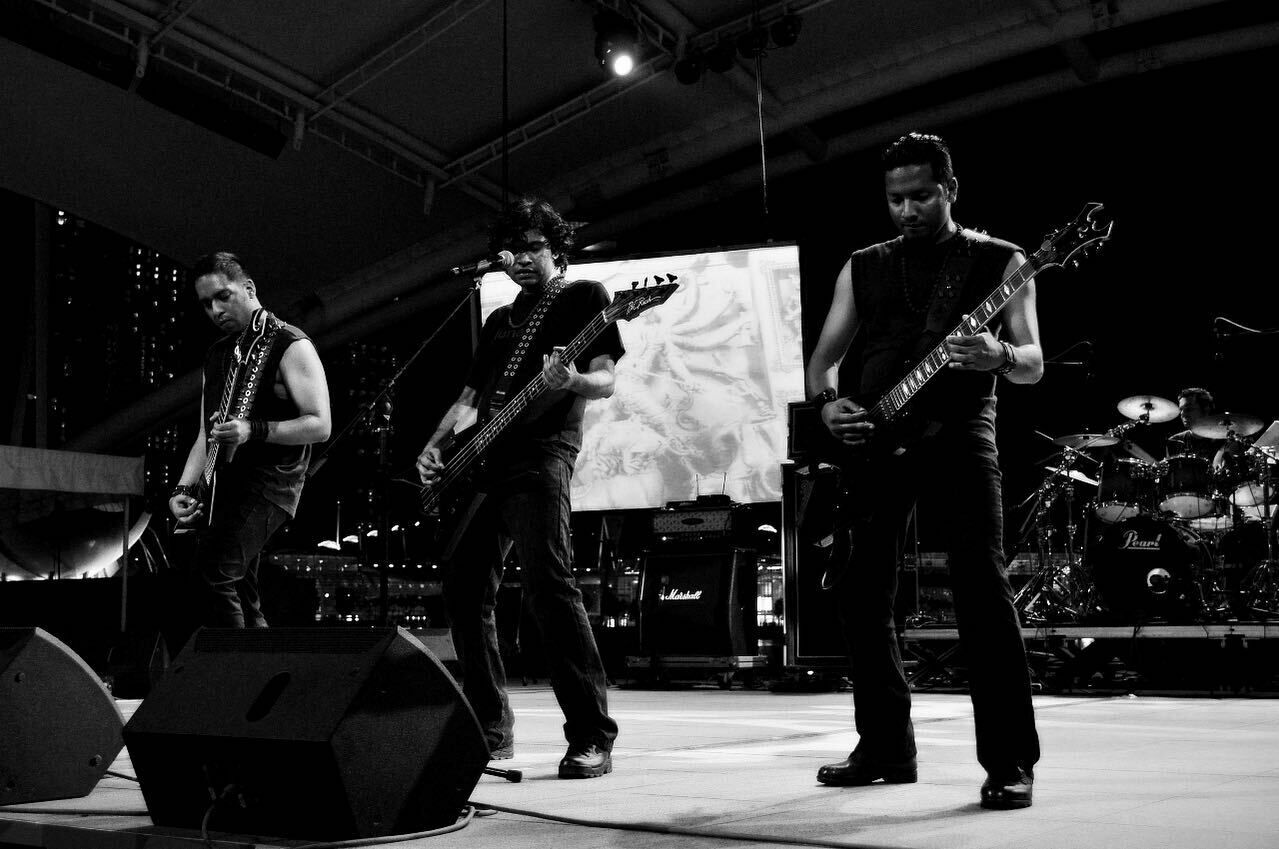
What was it like collaborating with Singaporean director Jacen Tan on the music video for ‘Hymns from the Blazing Chariot’?
Devan: That was a very nice experience, working with him from the concept stage, where he was coming up with the storyboard and all. It was very detailed, and we had a little bit of doubt in our mind about whether it could be achieved but he pulled it off by recording the video in front of a green screen. To see the end product after what we’ve been through, felt amazing.
Also, I've always wondered, how do you decide on which particular Sanskrit texts to focus each album on?
Kathir: Being the primary lyricist, I would start coming up with a very clear theme before the band even begins writing an album. We would decide on that before we even finalise the songs. Right when we conceive an idea or a vision, I usually go to my library to look at all the Sanskrit texts that would be connected to the theme. From there, we start coming up with the lyrics and that’s how we build the concept for an album. As Devan has shared, writing Transcendental was probably the most difficult experience for me as a lyricist because I had to choose from countless Sanskrit texts. I had to break it down and look at distinct themes. It was almost like a literature study. All the books were piled up on my desk, and on the weekends I would decide on what to shortlist.
BRAHMAVIDYA: IMMORTAL I (2011)
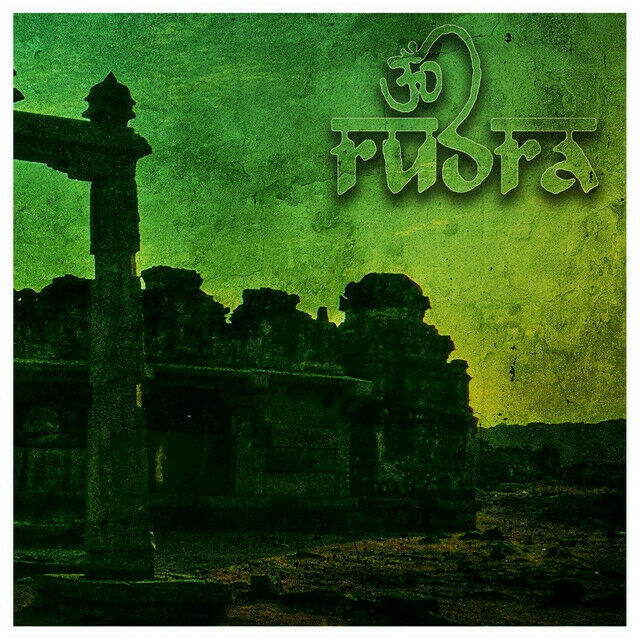
Let’s explore Immortal. Vinod, do you want to share more about that?
Vinod: So Immortal was actually my first album with Rudra. When I joined the band, it was quite stressful knowing that all their albums were so good, especially the first two from the trilogy. My concern was I didn’t want to come into the band to release an album that was a suck-y one. At that time, we thought about how we should approach the album. Primordial was heavy and fast, Transcendental was faster and a bit more chaotic so we were wondering what we were going to do with Immortal. We decided that maybe we should just take a step down with the tempo but add a little bit more groove to it. It was a fun experience because I was working with great musicians. The whole process was very different from what I’ve done with other bands. This time we sat down and wrote stuff together, and I had to try to deliver an Indian style of playing so the whole process was actually very fun and interesting. I mean, the drums were done in a landed house, and some of the guitars were done in Devan’s home as well. We recorded in a kind of do-it-yourself way so I enjoyed the whole experience.
Do you think the chanting on songs like ‘Illusory Enlightenment’ adds another dimension to the album?
Devan: Yeah, it does. Chanting brings the listener into more of a meditative state. That itself is a different kind of experience. Some bands do chanting as well but I would say in Rudra, it’s a lot more pronounced.
You’ve also mentioned that Immortal I is based on using logic and reason—would you care to reiterate more on this?
Kathir: In Indian philosophy, especially in that particular school of thought we usually write about, there are three foundations. The first foundation is called the revelatory texts, which was what Primordial was based on. Transcendental was based on texts that came later. The third foundation was logic and reasoning which was a very crucial part of that whole school of thought. The critical modes of enquiry and the deconstruction of ideas are part of that. The opening song ‘Now, Therefore’ is actually the first line of that very critical text.
RTA (2013)
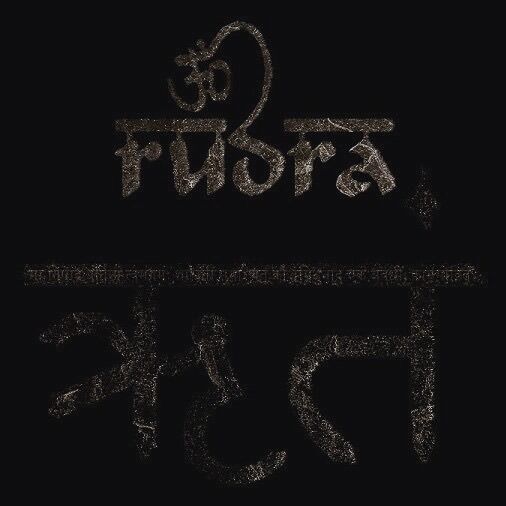
As RTA is reflective of Valmiki’s deeply emotive Ramayana, which is one of the largest epics in world literature, was there a sort of pressure to do it justice?
Vinod: We had a very different approach to RTA. This was one album where we actually sat down and went through Ramayana. We were just talking about what the characters were thinking, how they were feeling, and it was very interesting because, at that point in time, Shiva, Kathir, and I were just writing the songs in my bedroom. Shiva had my iPad with the drums on it, and we went through all the chapters and composed based on what we felt. Before we did that, Kathir actually bought me the book, and I spent a whole month reading it to understand what was really happening in the story. I wouldn’t say there was a lot of pressure but I definitely looked forward to reading it because I knew we were going to write an album about it so I really wanted to know more about the story. That definitely helped with the whole composition as well. You can feel the emotions just by listening to the songs.
ENEMY OF DUALITY (2016)
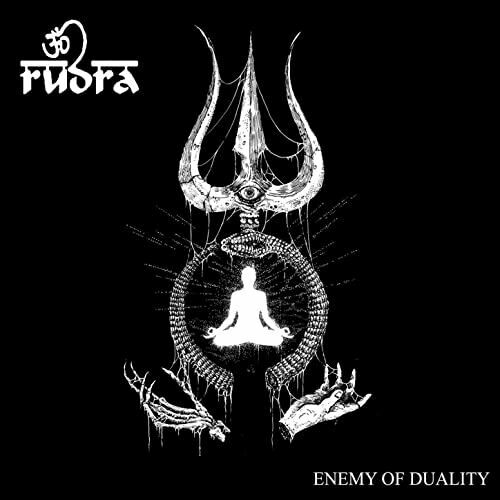
Last but certainly not least, we have Enemy of Duality.
Vinod: That’s another interesting album as well. In Enemy of Duality, we recorded most of the instruments ourselves, except for the drums which we had an engineer mix and master. We worked with our last guitarist Simon, and the whole process was quite fun because, with a different guitarist, the range they brought in was very distinctive as well. It’s definitely different from all the other albums because this is one where all of us were part of all the chanting. This was one where all of us were really really involved.
On this record, you guys utilised a lot of Indian classical instruments such as the didgeridoo, flute, sitar, and tablas. What was it like experimenting with all these instruments, and how do you integrate them so seamlessly into the songs?
Vinod: Kathir was quite heavily involved with the planning on where we should put certain instruments. I never knew the didgeridoo would work in our music but it turned out really well. The sitar was a first as well. But we found that all these added a lot of value to the songs.
Shiva: Vinod has pretty much covered everything. Again, mine is the b-side of the story. The drums were recorded at Leonard’s studio, and he was telling me that he didn’t like the electronic sound most metal bands have, the very heavily triggered kind of sound. Vinod remastered my drums and made them sound better on the album. But if you listen to the original take, it’s very organic. It’s like the old school Show No Mercy or Hell Awaits kind of drum sound. The last song ‘Ancient Fourth’ was just an ordinary song until they put in the traditional drums.
Vinod: We got percussionists from Damuru Singapore. I think this added a whole different dynamic to the song.
Kathir: The music video was 9-10 minutes long but we wanted to do it because we felt that song was very representative of who we are. We decided to go for the same director who did the music video for ‘Now, Therefore’ on Immortal. But this time we’ve got dancers, percussionists, we brought that all into one music video. We felt that it was a visual representation of the sound. It was an artistic exploration for us.
Okay, this is a bit of a tough question but if you guys had to rank your albums, how would you place them?
Kathir:
Enemy of Duality
Primordial I
RTA
Immortal I
The Aryan Crusade
Kurukshetra
Transcendental I
Rudra
Devan:
The Aryan Crusade
Rudra
Kurukshetra
Primordial I
Transcendental I
Immortal I
RTA
Enemy of Duality
Shiva:
Kurukshetra
Rudra
The Aryan Crusade
Transcendental I
Immortal I
RTA
Enemy of Duality
Primordial I
Vinod:
The Aryan Crusade
RTA
Kurukshetra
Immortal I
Enemy of Duality
Transcendental I
Rudra
Primordial I
And finally, what can concert-goers expect from the upcoming gig at The Esplanade Theatre in November?—how will it be different from your usual gig?
Vinod: When you listen to our album, you get to hear the heaviness of the album, and also the classical musicians playing but usually when we play live they’re not there. I guess what’s going to be different here is that it’s going to be where classical meets metal, and you’ll be able to watch all of us live.
Devan: What the audience will get is Vedic metal. You have the classical elements and the heaviness from metal. In a nutshell, that’s what Vedic metal is and that’s what you’re going to get.
Shiva: It’s going to be quite challenging for us because we have not done this before, and this is the first time we’re playing in a concert hall. That’s very exciting and I’m thinking about how to get the sound out well. For the audience, it’s going to be something different watching a metal band playing in a concert hall set-up with the female vocals and flautists. I think it’s going to be awesome.
View this post on Instagram
Kathir: My take is that this is unprecedented. No extreme metal band has brought Indian classical music on stage. The bands that have done it before in India have perhaps brought all the classical elements into their music but not the extremity of metal. We’re going to be playing blast beats, double pedal, and we’re going to be super heavy on stage whilst bringing all the classical elements together.
That is going to be really big for us, and I don’t think we will ever do this again in Singapore. It’s going to be just one night. It was very challenging for us to do this. We worked many hours, every one of us. We even did pre-production on this one. But you know what happened Ynez? We became fans of the very thing that we have created. There are many times the four of us have said that we wanted to be in the audience instead of playing because we wanted to witness this.
I also want to emphasize that we are very grateful to the three musicians—Aditi, the vocalist, Viknash (mridangam), and Ragha (flute). These people have really brought life into this collaboration. I think metalheads in Singapore should check this out for the mere fact that it’s happening locally, and we won’t do this again.
View this post on Instagram
Rudra will be playing at the Esplanade Theatre on 27 November this year. Get your tickets here.
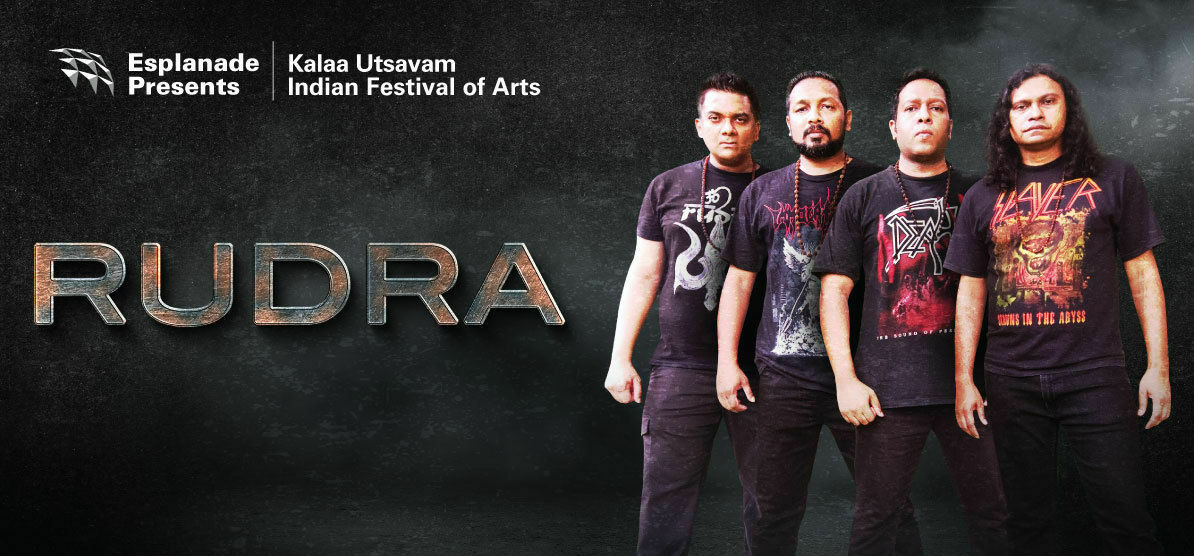
This article originally appeared on Bandwagon.



